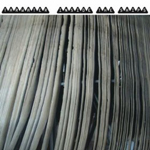|
|
 |
Dusted Reviews
Artist: Tarwater Album: Inside the Ships Label: Bureau B Review date: Oct. 27, 2011 |

|
|
|
 |
“Photographed,” the opening track on Tarwater’s Inside the Ships, sounds like a lost transmission from a 1995 Berlin radio show. It’s fitting, considering that Ronald Lippok and Bernd Jestram started Tarwater in the German capital around that time. They’ve done very little to update their aesthetic 16 years hence, so at a glance, the duo almost sounds dated: Lippok continues to sing with clipped, almost-spoken deadpan delivery; organic instrumentation shares equal space with electronics; and they’re still defiantly quirky. In this light, Tarwater is similar to Stereolab — completely consistent, without a post-millennial reinvention, and in a sense, perfectly content with such a uniform career arc.
More often than not, tackling a vast catalogue is recommended in chronological order (and at piecemeal), but in Tarwater’s case, one could do well working backward through its 10 studio albums, starting here. Elements of their greater output — post-punk, post-rock, ambient, kraut, downtempo and IDM — are all channeled equally and with great command on Inside the Ships. Lippok and Jestram are still as arty as ever: Faint notions of other-worldliness and abstract spaces appear throughout, but never congeal into concept-album territory. (They initially did intend to do so, but shelved the idea of a “space opera.”) The impression I get instead is a sense of joy — singing in German for the first time (“Sato Sato”), using a Baudelaire poem for inspiration (“Palace At 5AM”), and generally bouncing ideas of each other.
Production geeks will appreciate the record’s audiophile tendencies, where sound-design is almost taken to heights of fetishism (which has served as a nice respite from the lo-fi/low bit-rate music in my rotation). The instrumental passage “Furkan” suggests that the sax is back (in Berlin, at least), with a plaintive, oscillating solo, and the well-EQ’ed 909 on “Radio War” serves as a backbeat to the album’s most dramatic song. The post-punk guitars and additional sax on “There Never was a Night” are complemented by arresting robotic vocals to near narcotic effect.
Tarwater’s cover of the John Lennon/Yoko Ono b-side “Do The Oz” is reimagined and updated so well, it plays like a new composition, and Lippok’s cool delivery stands in nice contrast to the original. It’s a tad long, though, which highlights one of the record’s inherent flaws: a gnawing feeling of aimlessness. Lippok and Jestram are older gents and they do things on their own terms, eschewing traditional hooks or memorable melodies, and while there are some pop-aspects to this album, they’re hardly hummable.
While attempting to make some inroads on this review, I asked a music-obsessive type friend of mine about Tarwater. “They’re great, when you remember they exist,” he said. I think that’s a lot more poignant than it sounds. While they’re on the platter, there’s a lot to love, but it’s a matter of how often they end up there, and how much of the experience one recalls. I can’t say I’ll be giving Inside the Ships more spins this year, but it’s offbeat charm never felt like a waste of my time when I did, and that’s more than I can say for most albums this year.
By Jon Dempsey
|







